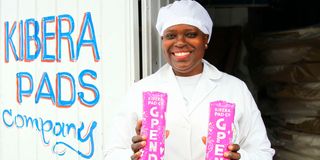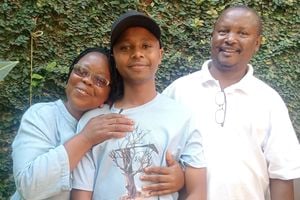Restoring dignity: How company fights period poverty and empowers Kibera girls

Esther Musavi at Polycom Development office in Kibera, Nairobi.
What you need to know:
- Domestic struggles turn to hope as GBV survivors empower slum girls with sanitary pads.
- GBV survivors combat period poverty, reduce GBV, and empower vulnerable women through pad-making and economic programmes.
Joyce Wambui was happy when she got married and looked forward to having a wonderful family with the love of her life.
Being the firstborn and an orphan, she saw it fit to bring along her younger siblings to live with her. And even though she did that out of humanity and love, that became the genesis of a friction between her and her husband.
“The matter brought a lot of issues between me and my husband. He started questioning why I had brought my siblings along as the burden was so heavy for him. Our arguments resulted in domestic violence most of the time,” the mother of three tells Nation.Africa in an interview.
Just as her marriage life seemed to hit the rocks, Joyce secured a job that she notes helped restore peace and harmony in her family. She got a job at Kibera Pads Company, which is the brainchild of Polycom Girls, a non-governmental organisation.
She joined a group of survivors of gender-based violence (GBV) employed in the organisation and involved in making sanitary pads for the vulnerable girls in the slum. In return, the survivors had a livelihood and incomes they used to take care of themselves and their families.
“The job was God-sent. The income I earn has helped me to take care of my family, including my children and siblings. I am now able to buy food for the family. It has helped me end the violence that was there before and we can both provide.”
She notes that the initiatives have helped girls in the slum, as those below 18 years old access them for free and those above 18 at subsidised rate.
“Period poverty has been the reason many girls in Kibera and other slums undergo sexual and gender-based violence. Girls have been lied to by men asking for sexual favours in exchange for sanitary pads.”
Even though she declines to reveal how much she earns per day, Joyce adds that it is good enough to take care of herself and her family. Resource inequality has been associated with domestic abuse with unemployed women facing greater risk of abuse.
Benjamin Angoya, a HeforShe champion and technical assistant, says the initiative has helped many girls in Kibera to escape being victims of sexual violence.
“As a parent with daughters, I want to ensure they are safe and grow in a safe environment. As a man, I have learnt it’s important to safeguard girls. Men getting involved in the fight against GBV will help reduce the vice,” Benjamin tells Nation.Africa.
Esther Musavi, the coordinator of the project, says sexual and gender-based violence among girls as a result of period poverty, has been the main challenge the initiative has come to cure.
“Sanitary towels are expensive and many mothers here cannot afford to buy for their daughters and themselves as many are of reproductive age. That made girls here vulnerable and prone to sexual violence and manipulation,” she says in an interview.
Every day, Esther says the company, which has seven GBV survivors, makes at least 400 pads, which are distributed in Kibra through the school sanitary programme. “Every year, about 3,000 girls in Kibra benefit from the sanitary pads through the programme free for girls below the age of 18. Besides Kibera, the organisation serves in other slums in Nairobi and beyond; they come for the pads at a subsidised rate of Sh45. This year, the initiative has seen 28,000 sanitary pads being distributed in Nairobi and other parts of the country to vulnerable girls,” she adds.
Esther says the initiative is a livelihood for GBV survivors. She adds that the organisation has implemented it through the support of a well-wisher from Australia who helps them with materials for making sanitary pads. “This well-wisher has been helpful; were it not for her, we would not have this project. The Australian Embassy has also been instrumental in ensuring we get the materials without any delays at the port.”
She says expansion plans are in top gear, with the organisation already setting up a small sanitary towels manufacturing unit in Mbita, Homa Bay County, to cater to vulnerable girls. It has not, however, been a bed of roses for the organisation, according to Esther, who reveals they have had to contend with myriad challenges to ensure smooth operations.
She lists political instability as one of the factors that at times affect their operations. “When there are protests, they affect us so much. We are forced to close down and halt our operations. This usually affects the supply of the pads to the girls.”
Many girls and women from informal settlements suffer from period poverty due to high poverty. Research shows that 90 per cent of women in Kenya’s slums cannot afford hygienic products and only 30 per cent of schools in the slums have hygienic services.
As a consequence, girls often rely on the men in their lives for period products and some girls engage in transactional sex to secure sanitary products, perpetuating a patriarchal cycle of exploitation. During menstrual periods, girls are also forced to stay at home. Because they cannot go to school, they miss almost one week every month.
Research by Menstrual Hygiene Day, a global advocacy platform for non-profit organisations and government agencies to promote menstrual health, shows 65 per cent of women and girls in Kenya cannot afford sanitary pads.
According to research by the Ministry of Education, girls lose on average four school days every month, which translates into two weeks of learning each term. Over four years of high school, they lose on average 165 learning days.
Besides offering livelihood opportunities to GBV survivors through the pad-making initiatives, Polycom is also offering psychological support through referrals to professional counsellors. It also undertakes economic programmes that equip women with savings and investment skills to help them build sustainable futures.




